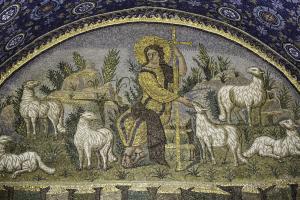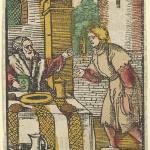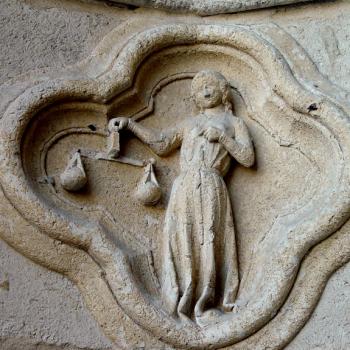
Abba Poemen, whose name means, “shepherd,” was well regarded and remembered in the Alphabetical Sayings of the Desert Fathers, as can be seen in the fact that one seventh of the sayings in that collection are those attributed to him. It should not be surprising that this was, in part, because of how good a spiritual director he was; he could be said to have been a good shepherd, who helped and cared for all the monks who came to him for advice. He led his monastic community with wisdom and grace. Following the example of Jesus, he showed more concern for the well-being of others than his own personal desires. We must keep in mind that he joined the desert community like the other monks, looking for a place to live in order to engage a life of ascetic discipline and peaceful contemplation. To be sure, thanks to the way early monastic communities were formed, he had plenty of time to do so, but he still had to make sure he took the time to deal with others, indeed, putting their interests above his own. He knew, like Abraham, that hospitality was key, which is why, even if he wanted to live in solitude, and engage in it a strict fasting regime as a part of his own discipline, he let the expectations placed upon him by the rules of hospitality overrule his discipline, even if it saddened him: “It was said of Abba Poemen that if he was invited to eat against his will, he wept but went, so as not to refuse to obey his brother and cause him pain.” [1]
Similarly, as a shepherd, Poemen knew he was to encourage those who came to him for spiritual direction. While he knew how easy it is for many to become over-scrupulous, or worse, to fall into despair, he also knew these temptations were especially common ones for those who entered into the religious life. This was especially true for those who went into the desert, living mostly alone. For then, they had little to stand between themselves and their own internal demons. Indeed, he understood how such solitude helped people become much more aware of their own failures, so that, as they sought perfection, they would become so focused on their failures instead of their successes, and focus on them instead of their successes. Such a focus would have them become stuck, unable to overcome their personal demons. Because they felt they should do all things by themselves, to prove themselves to be superior spiritual athletes, they would find themselves denying the help from others which they needed.
Poemen didn’t deny the problems of sin, and the way sin could and did cause harm, but he also knew that God’s love and grace was greater. No matter what someone had done, God’s grace could lift them up, and heal them, so that even the greatest sinner has hope for their salvation. Everyone can be welcomed back by God. Since the monastic community used penance as a part of their own spiritual development, as a way to help purify themselves from all kinds of harmful inclinations, many monks thought they had to be pure, had to be perfect, before they could be received by God, and so they followed strict rules of penance, thinking they had to fulfill many great feats before God would save them. It is a misguided understanding many, even outside the religious life, have today. Poemen knew he had to confront that attitude when he saw it, which is why, when some monks asked him what they needed to do in order to receive God’s forgiveness, his reply, his wisdom was such that he reminded them that the answer did not lie in excessive penance:
A brother questioned Abba Poemen saying, ‘I have committed a great sin and I want to do penance for three years.’ The old man said to him, ‘That is a lot.’ The brother said, ‘For one year?’ The old man said again, ‘That is a lot.’ Those who were present said, ‘For forty days?’ He said again, ‘That is a lot.’ He added, ‘I myself say that if a man repents with his whole heart and does not intend to commit the sin any more, God will accept him after only three days.’[2]
In reality, God can forgive anyone in an instant. Poemen is not disputing that. And so, while we can read him as saying that it could take as little as three days of penance to be totally absolved for sin, we can also see this as a subtle indication of the relationship between Jesus’ work for us and forgiveness, for it can be said that God accepts all of us after three days because it was after three days Jesus rose from the dead. It is Jesus’ work, and the work done in those three days of his passion, which reconciles the world to God. While monastic communities, and with it, the church, will often expect all kinds of penance to be done to make sure someone reforms enough to find their relationship with their community restored, we must remember that this is secondary, and all we need for forgiveness is a contrite heart which readily receives God’s love and mercy in return.
Abba Poemen represents what a good spiritual guide should be like. They should not be excessively concerned about themselves. They should not to be interested in self-promotion. Rather, they should be concerned about the needs, the real needs, of the people around them. They will not focus on themselves, on their own wants and desires (though, of course, they will not neglect their own personal needs). They will lift people up, finding ways to help them so that they do not give into despair. Good shepherds will know the way to do this is to focus on grace, to show people the great love God has for them, indeed to remind them what Jesus did for them so as to make sure they know God has not and will not give up on them. And, just as we should want this in our leaders, even if we are not to become one ourselves, we should take these principles upon ourselves, to live them out, perhaps in a lesser form. We should show love to our neighbors, remembering that we are expected to be as concerned about them as we are for ourselves. We are to look after them, and try to help them when they are down, exhorting them and encouraging them rather than making them feel worse when they down. And thus, though we are not always expected to be spiritual leaders or guides, we should all follow the example of Jesus, the good shepherd, looking at how we can best represent him and his love to the world.
[1] The Sayings of the Desert Fathers. trans. Benedicta Ward (Kalamazoo, MI: Cistercian Publications, 1984), 169 [Saying of Abba Poemen #17].
[2] The Sayings of the Desert Fathers, 169 [Saying of Abba Poemen #12].
Stay in touch! Like A Little Bit of Nothing on Facebook.
If you liked what you read, please consider sharing it with your friends and family!

















